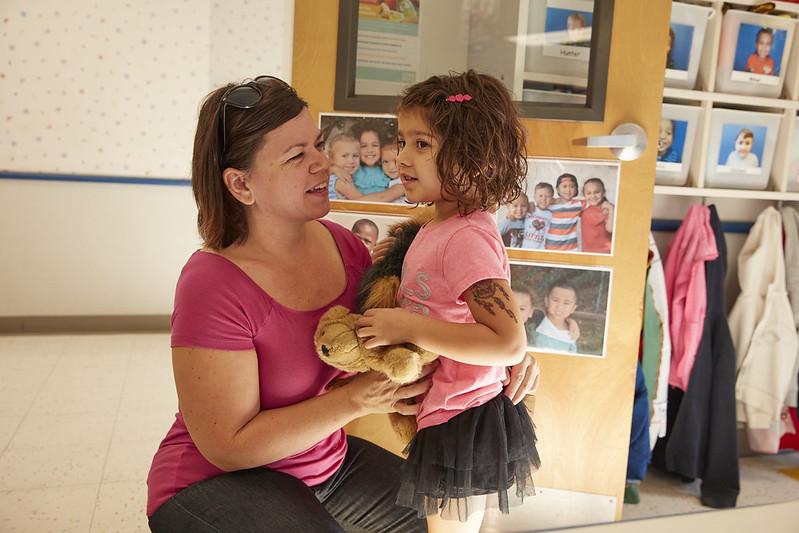
Foster Meaningful Conversations with Your Kids as School Returns
As summer winds down and children prepare to hit the books again, parents are undoubtedly gearing up for the hustle and bustle of the school year. It’s that time when backpacks are packed, school supplies are bought, and routines are reestablished. Amidst this flurry of activity, one of the most crucial aspects parents often overlook is fostering effective communication with their children, particularly when it comes to discussing their school experiences. You know the drill: “How was your day?” typically invites a predictable, half-hearted response. But what if there was a way to transform these mundane exchanges into meaningful conversations that not only bridge the gap between your experiences and theirs but also help alleviate any first-day jitters?
Making Everyday Moments Count
Ariel Bronson, a KinderCare Inclusion Services Advisor, offers valuable insight into how parents can cultivate these enriching discussions without requiring a complete overhaul of their daily schedules. “You don’t have to set aside a specific time in your day to have impactful discussions with your child,” Bronson explains. “Instead, you can seize small moments in your everyday routine — during car rides, meal times, or even while doing chores — to nurture your relationship and engage in deeper conversations.”
This concept emphasizes quality over quantity. It’s not about finding an entire evening to chat but rather embracing the small pockets of time that can serve as opportunities for connection. Leaning into those unplanned moments can lead to genuine exchanges. Imagine chatting with your child during a dinner prep or while waiting for the car to warm up. These snippets of time can be incredibly valuable!
Encouraging Openness
Here are some practical strategies parents can employ to encourage children to share more about their day:
1. Ask Open-Ended Questions: Move beyond simple inquiries. Instead of just asking, “How was school?” consider questions like, “What was the most fun thing you did today?” or “Did anything surprising happen in class?” Open-ended questions invite children to elaborate rather than provide one-word answers.
2. Be a Good Listener: When your child shares something, listen actively. Show them that their thoughts and feelings matter. Nodding, making eye contact, and repeating back what you’ve heard can reinforce the idea that this is a safe space for sharing.
3. Share Your Own Day: Make the conversation reciprocal. Share an interesting anecdote from your day that relates to something they experienced. This not only models the kind of information sharing you’d like to see but also creates a two-way dialogue.
4. Create a Routine: While specific time blocks may not be necessary, developing a habit can help. Perhaps at dinner, you can make it a tradition to talk about one favorite moment from the day. Over time, your children may start to look forward to these conversations, seeing them as a highlight rather than a chore.
5. Normalize Anxieties: Children may feel anxious about new experiences, especially at the start of a new school year. Normalize these feelings by talking about your own concerns. Reassure them that it’s okay to feel nervous and that you’re there to help them navigate their feelings.
Building Confidence and Connection
Establishing a habit of open dialogue can significantly impact your child’s emotional well-being. Feeling comfortable speaking about their day not only strengthens your bond but also nurtures their confidence. When children believe their voices are heard, they’re more likely to express themselves freely, whether about school issues, friendships, or even personal thoughts and feelings.
As children gear up for another academic year, it’s vital for parents to step in with strategies that promote meaningful dialogues. The school day can often feel overwhelming, and talking about it can serve as a valuable emotional outlet. By taking advantage of fleeting moments throughout the day, showing genuine interest, and fostering a supportive environment, parents can help mitigate their children’s anxieties and build stronger relationships — one conversation at a time.
In conclusion, the back-to-school period is an opportune time for families to realign their communication habits. By embracing the power of open dialogue and engaging in daily moments of connection, parents can enrich their children’s school experience and cultivate a lifelong love for sharing. After all, impactful conversations are not reserved for special occasions; they happen in the everyday exchanges we share with our loved ones. So this school year, don’t just ask how their day was—delve deeper, listen actively, and watch your relationships flourish.


